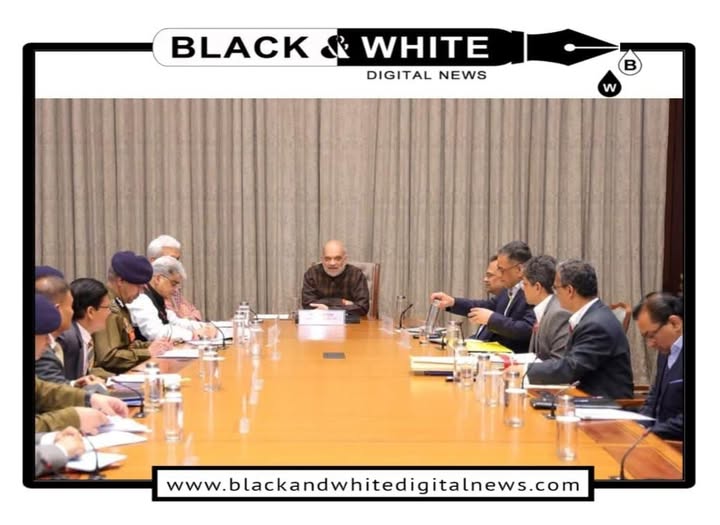Amit Shah Chairs Security Review Meeting on J&K: Calls for ‘Ruthless’ Action Against Terrorism and Infiltration
||Black and White Digital News ||
||Parvinder Singh February 05,2025 ||
Union Home Minister Amit Shah chaired a high-level security review meeting in New Delhi on Tuesday, focusing on the situation in Jammu and Kashmir (J&K). The meeting follows a recent surge in terrorist activities, including an attack in South Kashmir’s Kulgam district, where a former army personnel, Manzoor Ahmad Wagay, was killed, and his wife and niece were injured.
The security review comes amid the Modi government’s continued push for a ‘zero-tolerance’ approach to terrorism in J&K. Over the past few years, the government has implemented a series of counter-terror measures, including the abrogation of Article 370, strengthening security forces’ operations, and cracking down on terror funding.
Meeting Details and Key Attendees
The meeting was attended by:
• Lieutenant Governor of J&K – Manoj Sinha
• Director of the Intelligence Bureau
• Chief Secretary and Director General of Police (DGP), J&K
• Senior officials from the Ministry of Home Affairs (MHA) and the J&K administration
Additionally, a separate security review was held a day earlier, which included:
• Chief of Army Staff – General Upendra Dwivedi
• Senior officers from MHA and the Army
Key Decisions and Government Stance
1. ‘Ruthless’ Action Against Terror and Infiltration
Amit Shah made it clear that the government aims for complete eradication of terrorism from Jammu and Kashmir. He called for:
• Stepping up counter-terror operations to achieve a “zero infiltration” goal.
• More stringent action against infiltration and terror activities, adopting a “ruthless approach” against those involved.
• Uprooting the existence of terrorists, ensuring their networks are dismantled permanently.
2. Cracking Down on Narco-Terrorism and Funding
• Shah highlighted the narcotics trade as a major financial source for terrorism.
• He ordered swift action against terror financing, particularly through drug networks.
• Security agencies were instructed to tackle narco-terror networks with urgency and rigor.
3. Strengthening Forensic and Criminal Law Enforcement
• Shah emphasized the need to enhance forensic capabilities to support investigations.
• He directed new appointments in Forensic Science Laboratories (FSL) for timely enforcement of new criminal laws.
4. Recognition of Security Agencies’ Efforts
• Amit Shah acknowledged significant security improvements in J&K due to coordinated efforts.
• He urged agencies to remain vigilant and maintain synergy in their operations.
Security and Operational Impact
The directives from Amit Shah reinforce the Modi government’s strategy to eliminate terrorism and secure J&K:
• Increased Counter-Terror Operations – The push for “ruthless action” suggests escalated military and intelligence operations against terrorist groups.
• Heightened Border Security – The emphasis on “zero infiltration” signals tighter surveillance and security measures along the LoC.
• Stronger Legal Framework – The focus on forensic and legal appointments indicates a move towards faster prosecution of terror-related cases.
Political and Diplomatic Angle
• The meeting comes as J&K prepares for Assembly elections, making security a top priority for the government.
• India’s firm stance on terror may also have diplomatic implications, particularly in relations with Pakistan, which has been accused of supporting cross-border terrorism.
• The crackdown on narco-terrorism aligns with global anti-terror funding efforts, reinforcing India’s commitment to counterterrorism cooperation with international partners.
Amit Shah’s security review meeting underscores the government’s uncompromising stance against terrorism in Jammu and Kashmir. With a multi-pronged approach targeting infiltration, terror financing, and law enforcement, the Modi government continues to tighten its grip on security in the region. However, with recent attacks indicating persistent militant threats, the success of these measures will depend on their effective implementation and coordination among security forces.



